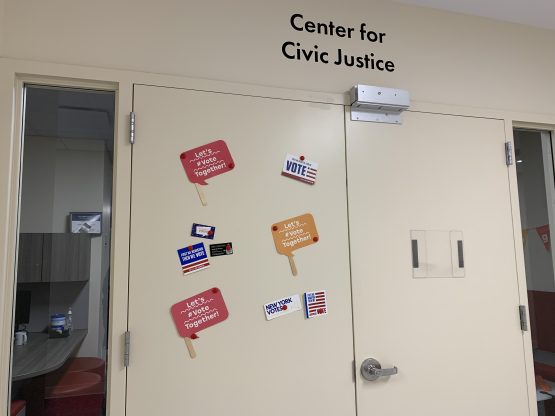
On March 2, the Center for Civic Justice held their first “Community Dialogue” event about accessing healthcare in underserved communities.
Healthcare comes in all forms and offers support to people from all walks of life. The idea of driving innovative healthcare solutions has been prominent in many policymakers’ minds; however, healthcare reigns both controversial and troublesome in underserved communities.
In 2022, many Americans believe that healthcare should be granted as a human right, not a privilege. Still, debates swarm around who really needs proper coverage and why. The healthcare system in the United States is burdened with disparities associated with a panoply of factors, including complex interactions between race/ethnicity and socioeconomic status, geographic access to care and health insurance status.
Thus, the Center for Civic Justice has taken it upon themselves to bring a discussion surrounding healthcare into our campus. The Center provided each group with a background guide on all sub-themes discussed that night, which was used very often in the roundtable talks.
The audience first met with undergraduate coordinator Pooja Madhanraj, who introduced the first sub-theme of the night, mental healthcare. Associate director of the Center for Prevention and Outreach Danielle Merolla came to the stage to present on how the COVID-19 pandemic has had some troubling impacts on college students’ mental health. Merolla stated that “86% report concerns about their personal safety and security,” and additionally “66% report that the pandemic has resulted in more financial stress.”
Many of these concerns can easily fester and become long-term mental health conditions that can drastically affect one’s social, emotional and psychological well-being, which begs the question: is America making mental health a priority?
Stony Brook students do not seem to think so.
“There are too many barriers that hinder any individual access to healthcare, such as class and socioeconomic status,” Undergraduate Student Government vice president Victoria Sarita said.
One could argue that there has been some improvement in how the United States views mental health, as new treatments — such as psychotherapy and pharmacotherapy — are becoming more prominent. But are these alternative treatments viable solutions that can be integrated in currently utilized treatment methods? Grace Armann, the Center’s intern and a junior political science major, believes so.
“There’s something to be said about how medication comes into play when dealing with mental health conditions,” Armann said. “However, there are many psychiatrists who have not developed a consistent framework in checking up with the patient, rather than giving them medication and sending them on their own. Many clinics are not ‘patient first,’ but more so ‘patient last.’”
It is quite clear that America has more work to do when it comes to implementing resources for those with mental health conditions, as clinics have not perfected a system where one can easily come for help.
However, others seem to applaud the effort Stony Brook has made when dealing with mental health. Scholars in Medicine sophomore Eshwin Varghese stated how Stony Brook has provided their students with many tools and resources in the wake of the pandemic.
Varghese said, “I like to think of Stony Brook as what other communities can and should be.”
The dialogue continued with a focus on another sub-theme: immigrant healthcare. This next presentation shared an interesting point from the article, “Barriers to health care for undocumented immigrants: a literature review,” stating that national policies excluding undocumented immigrants from receiving health care were the most commonly cited barriers to healthcare.
Even today’s Affordable Care Act covers naturalized citizens and those born in the U.S., while lawfully present immigrants are subject to the individual mandate and related tax penalty, including the five-year or more waiting period for most lawfully residing, low-income immigrant adults. Additionally, undocumented immigrants recieve no federal coverage; they are not allowed to purchase private health insurance at full cost in state insurance exchange.
Participants began to discuss whether healthcare is so crucial to livelihood. They also posed the question, should the Affordable Care Act cover undocumented immigrants?
“Yes it is and yes it should,” Armann said, matter-of-factly.
Finally, to end a night of thought-provoking discussion, the conversation briefly touched on healthcare for people with disabilities. Those with disabilities are more likely to be in poor health and to seek medical help at a higher rate than people without such impairments. However, there are existing prejudices in the healthcare system, such as a lack of adequate training, accessible medical facilities, examination equipment, sign language interpreters and tailored modifications that prevent them from receiving the resources they need.
The Center for Civic Justice presented some possible solutions in tackling this challenge.
The organization’s background guide, noting the group’s values and mission, offered ideas for solutions such as “allowing for programmatic access to healthcare in local institutions by incorporating policies and procedures as appropriate could be a plausible solution at the local level.”
The guide also informs readers that “programmatic access means that the policies and procedures that are part of the delivery of healthcare do not hinder the ability of people with disabilities to receive the same quality of care as other persons.”
Many of the students also had feedback to share at the conclusion of the event. Some would like to hear more about the intersectionality of healthcare, including sexuality and gender identity.
“I would definitely like to discuss how the LGBTQ+ community is affected by our broken healthcare system,” one junior student said. Another student wishes to see how HIV/AIDS can be included into the discussion.
All in all, the Center for Civic Justice’s first Community Dialogue was a huge success. From the information provided by SBU’s very own undergraduate coordinators to the heated discussions in how students envision the future of healthcare, many should be looking forward to attending more dialogues like this with Stony Brook’s very own future politicians, doctors and leaders.












